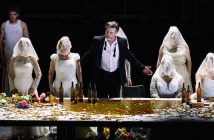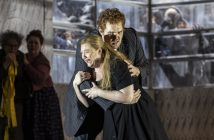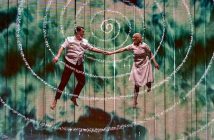There is an effect that Jonathan Dove’s Flight has that does something unlike anything one might expect in opera; it requires you to listen. Unlike the popular classics, where we might allow the music to waft pleasantly over us, there are few signposted melodies, little in the way of conventional structure and, with the exception of one haunting solo at the beginning of Act II, little in the way of arias. The score is fitful, challenging and often punctuated by discordant beats and decidedly unconventional orchestration. The singing, too, feels almost like continuous recitative. But, if you listen, it is one of the most rewarding musical experiences you’re likely to have.
Flight follows an ensemble cast of characters holed up in an airport terminal over 24 hours. There is the holidaying couple, off to sunnier shores to rekindle a stale marriage; an older woman attempting, inconspicuously, to meet her new young paramour; a husband and his pregnant wife emigrating to Minsk; a steward and stewardess, focused more on their affections than on the job at at hand, and above them all, the Controller, from the tower, commenting on the action. The key figure, listed simply as ‘Refugee’ in the cast, provides the glue for the ensemble. It may sound similar to that of Tom Hanks’s character in the film The Terminal but other than the fact that he is stranded in an airport, the comparisons in the story end there – what’s more, Flight was composed some six years before Spielberg’s movie.
But there is one other element that makes Flight comparable to films in scale, however; the score is incredibly cinematic. Rather than accompany the action, with incidental exposition while we wait for the aria, the score works to echo the action, weaving in and out to react to it and, invariably, pre-empt it – in one notable comedic sequence with some percussive commentary on the cabin crew’s tryst in a lift – and, stylistically, dips in and out of melodic sequences and leitmotif, much like a film score. It is the operatic equivalent of tapas, if you’ll forgive the analogy, but, like tapas, you often come away fuller than with a conventional meal.
The story – with a libretto by April de Angelis – and the orchestration really get into their stride at the opening of the second act; a storm grounds all air traffic and our motley passengers and their hosts are left to their own devices overnight. With some clever back projection on the terminal building, the atmosphere becomes decidedly turbulent as the storm moves in, drinks trolleys are opened and truths are revealed. We are treated to what must surely become one of contemporary opera’s ‘classic’ arias with Victoria Simmonds’ Minskwoman delivering a haunting and moving lament, and we are propelled into a captivating combination of the tragic and the comic, at times simultaneously, illustrated by some complex octets and dramatic show pieces from the orchestra.
From the start, Flight is full of surprises; the singing might feel like recitative but there are some incredible ranges on display; Jennifer France’s Controller hitting top F in the opening bars, and some beautiful harmonies and canons, not to mention comedic quirks in the lyrics – who knew you could conga to a song featuring “snorkels and sandals, donkeys and falafels’ – but perhaps the biggest surprise comes with James Laing’s refugee. The part is counter tenor. “Other than Nero, there aren’t many parts for counter-tenors in opera,” James says, “it’s more familiar in Purcell and Monteverdi, so this is a gift, really, particularly in something so contemporary.” If Dove wanted to do something different, he certainly has.
But is it all fancy modernism? Well, yes and no. The melodies may be tantalisingly short but enthusiasts of the classics will not be disappointed by Flight, for there is a real story to Dove’s opera – not simply a vehicle for the music – building to a particularly poignant, near tear-jerking ending. And, what’s more, there are some wonderfully comic moments, some genuinely laugh-out-loud and Mozartesque in their bawdiness. Dove, in fact, cites his influences as Britten for story-telling, Stravinsky for harmony and Mozart and Rossini for comedy. That strikes me as a perfect summary of the component parts of Flight and makes a recipe for a terrific evening’s entertainment.
Flight runs until Friday 19th June at Opera Holland Park. For more information, including details of the complete 2015 season, visit www.operahollandpark.com.




